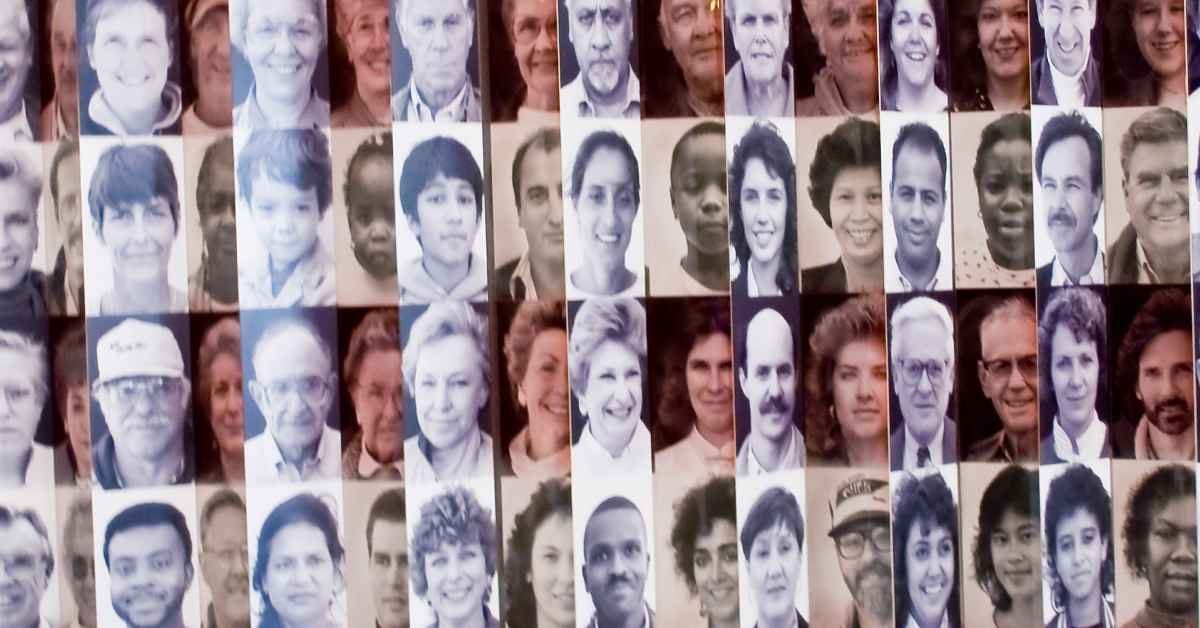“Are the mystics and sages insane? Because they all tell variations on the same story, don’t they? The story of awakening one morning and discovering you are one with the All, in a timeless and eternal and infinite fashion. Yes, maybe they are crazy, these divine fools. Maybe they are mumbling idiots in the face of the Abyss. Maybe they need a nice, understanding therapist. Yes, I’m sure that would help. But then, I wonder. Maybe the evolutionary sequence really is from matter to body to mind to soul to spirit, each transcending and including, each with a greater depth and greater consciousness and wider embrace. And in the highest reaches of evolution, maybe, just maybe, an individual’s consciousness does indeed touch infinity—a total embrace of the entire Cosmos—that is Spirit awakened to its own true nature. It’s at least plausible. And tell me: is that story, sung by mystics and sages the world over, any crazier than the scientific materialism story, which is that the entire sequence is a tale told by an idiot, full of sound and fury, signifying nothing? Listen very carefully. Just which of those two stories actually sounds totally insane?”
Over the Thanksgiving holidays I was bouncing between the relative realities of friends, family, and in-laws and ultimate reality as defined and exemplified by some extraordinary people. I am grateful for both sets of reality, but I’m more compelled by the latter which, for me, means “being where we are now at One with All.” In this post, I will explore the gradations and the differences between relative and ultimate reality, how to transcend our current reality, and how to include people in the process. I hope that’s not too much stuffing for one post.
Relative realities revolve around careers, personal relationships, medical challenges, as well as political, economic, and social issues that come up in conversation. Ultimate realities are addressed in esoteric literature and moving movies. Relative realities are more objective, exterior, and focused on the individual. Ultimate reality is more subjective, interior, and focused on the collective.
Over the holiday, I found myself immersed in both realities. I won’t go into the details of the relative realities, but I do want to share the mind-boggling and heart enlarging work of three amazing people who deepened my experience of ultimate reality: Ken Wilber, Karen Armstrong, and Mr. Rogers. Yup, I put this unlikely threesome in a group because Wilber and Armstrong did the herculean task of investigating esoteric sources of growth over a long period of time, and Mister Rogers did the heroic work of making all that theory real. Oh, how I would love to have the three of them at a Thanksgiving dinner.
Let me provide a brief bio of each person and then summarize what I have learned.
Ken Wilber, born in 1949 in Oklahoma City, has written at least 40 books (many of which I have read) – 10 of which were written before he was 37 years old. He is widely known for his work on integral psychology, spirituality, and meditation. While studying pre-med at Duke, he became inspired by Eastern literature, particularly the Tao Te Ching. In 1983, Wilber married Terry “Treya” Killam who was shortly thereafter diagnosed with breast cancer. For the next 5 years, he dedicated himself entirely to caring for her. After she died in 1989, he wrote Grace and Grit which described their joint accounts of the experience. It was this book I read over the holidays. Highly recommended.
Wilbur has continued his exhaustive research and writing and continues to conduct seminars, one of which (The Science of Self Actualization) I took on-line over the Thanksgiving holiday. One of his main interests is to integrate some of the views of mysticism in Eastern and Western religions. He believes the mystical traditions provide access to transcendental or ultimate reality which has been the same throughout all times and cultures. Even though Wilber’s approach has been criticized as excessively categorizing and complex, I admire his contributions to the literature as well as his on-going commitment to the teaching of integral spirituality and psychology.
Karen Armstrong, born in 1944 in Worcestershire England, has written at least 27 books on comparative religion (many of which I have read). She was raised as a conservative Catholic, attended a convent, became a nun, left the convent, studied English at Oxford, and gradually became a more liberal and mystical Christian. In 1982, she published Through the Narrow Gate, a book on her convent experiences. Her extensive work since then examines the history of the world’s great religions. Based on her research, she concludes that “We urgently need to make compassion a clear, luminous and dynamic force in our polarized world. Rooted in a principled determination to transcend selfishness, compassion can break down political, dogmatic, ideological, and religious boundaries. Born on our deep interdependence, compassion is essential to human relationships. It is the path to enlightenment, and indispensable to the creation of a just economy and a peaceful global community.”
I’m currently reading Armstrong’s latest book, The Lost Art of Scripture: Rescuing the Sacred Texts, in which she argues that a narrow reading of scripture is a relatively recent phenomenon. For hundreds of years these texts were viewed as spiritual tools. Scripture was a means for the individual to connect with the divine, to transcend their physical existence, and to experience a higher level of consciousness. Holy texts were seen as fluid and adaptable, rather than a set of binding archaic rules or a “truth” that has to be “believed.” Even though Armstrong has been criticized for her “benign” view of Islam and for her use of historical argument, I admire her dedication to rediscovering holy texts and revealing the mystical and esoteric commonalities among all religions.
When I wasn’t involved in discussions of relative realities or reading about ultimate realities over the holidays, I took the opportunity to see It’s a Beautiful Day in the Neighborhood, a movie about Mister Rogers – brilliantly and believably played by Tom Hanks. Fred Rogers, born in 1928 in Latrobe, Pennsylvania, created Mister Rogers’ Neighborhood which ran from 1968 to 2001 (many episodes of which I watched appreciatively with my kids). Rogers earned a bachelor’s degree in music, a divinity degree from Pittsburgh Theological Seminary, studied child development, and worked in collaboration with a child psychologist for over 30 years. He died in 2003.
I loved It’s a Beautiful Day in the Neighborhood because it showed the power of presence, empathy, and compassion. And, it demonstrated that experience is more important than words. I thought the movie did an excellent job of portraying who Mister Rogers was and capturing his bravery, honest, and humility in applying the principles he so deeply believed in and lived by. Rogers was a living example of what Wilber and Armstrong write about—compassion and transcending your realities. He was the real deal.
So, what did I learn from all those conversations, books, and movies—a lot more about the differences between relative and ultimate reality and what it takes to transcend our current state. Here’s a brief overview.
First, I learned that ultimate reality, for me, is to be here now at One with All. Everything else is relative.
Second, I learned that experiencing moments of ultimate reality requires the development of a soul that houses our crystalized essence and makes it possible to notice what’s happening with the multiple dimensions of our lives. To me, the soul is what Artie Vipperla would say is “You You-ing You.”
Third, I learned that developing a soul requires leading a balanced and integrated life. According to Wilber, leading an integral life requires us to grow up, show up, clean up, wake up, and open up. I combined those requirements with the five dimensions of growth (physical, emotional, social, intellectual, and spiritual) and created scales to measure level of functioning in each dimension:
Growing Up Intellectually
- 5.0: Integral thinking
- 4.0: Inclusive thinking
- 3.0: Rational thinking
- 2.0: Mythological thinking
- 1.0: Magical thinking
Showing up Socially:
- 5.0: “THIS” orientation
- 4.0: “We” orientation
- 3.0: “You” orientation
- 2.0: “I” orientation
- 1.0: “It” orientation
Waking Up Spiritually:
- 5.0: Crystallized Essence
- 4.0: Unified Consciousness
- 3.0: Being Awake
- 2.0: Dreaming
- 1.0: Asleep
Cleaning Up Emotionally:
- 5.0: Transforming
- 4.0: Dealing
- 3.0: Acknowledging
- 2.0: Repressing
- 1.0: Denying
Opening Up Physically:
- 5.0: Boundless and Radiating
- 4.0: Warm and Welcoming
- 3.0: Gentle and Patient
- 2.0: Closed and Tight
- 1.0: Shriveled and Rushed
Here’s a short explanation of the scales. Intellectually, we can give into magical or mythological thinking; or we can engage in rational, inclusive or integral dialogue and problem solving. Socially, our conversations can revolve around materialism (it) or personal issues (I); or we can empathize with another’s experience (you), collaborate to achieve goals (We), or share transcendent experiences (THIS). Spiritually, we can live our lives asleep or day dreaming; or we can wake up, witness our own and others’ behaviors, or strive to become conscious and unified. Emotionally, we can deny or repress our own responsibilities; or we can acknowledge our role, deal with our issues, or transform problems into possibilities. Physically, we can present ourselves as shriveled, rushed, closed or tight; or we can come across as gentle, patient, warm, welcoming, boundless, and radiating.
A developed soul not only enables us to notice what level of functioning we are exhibiting in each area of our life, but also focuses us on moving up the scales. You know you have a developed soul when your “You is You-ing You.” Crystallized essence is the first You in You-Youing-You. It’s about agency, executive function, unified being, and free will. Without a crystallized essence, there is no You in charge. As Gurdjieff says, “Don’t say I and think it is you.” What he means by that is that different dimensions dominate by situation, i.e. sometimes our physical brain is in charge (addictions etc.), sometimes our emotional brains are in charge (anxiety, depression, anger), and sometimes our intellectual brains are in charge (analytical, logical rational). Depending on the situation, we show up differently when each dimension is in charge. Without a crystallized essence or sense of wholeness, there is no free will, agency, or executive functioning. And there is no way to notice what’s going on in the multiple dimensions of our lives. If we are satisfied with being one dimensional, then none of this matters.
In Life is real only then, when “I am,” Gurdjieff suggests that “truth can be approached only if all the parts which make up the human being—the thought, the feeling, and the body—are touched with the same force and in the particular way appropriate to each of them—failing which, development will inevitably be one sided and sooner or later come to a stop.”
To me, our hope rests in getting more people to function at least at level 3 in all dimensions of their life. Think about a world in which people were rational, empathic, awake, responsible, gentle and patient. Picture a world at level 4 in which people were inclusive, collaborative, observant, honest, warm and welcoming. And imagine a world at level 5 in which people were integrated, conscious, unified, constantly transforming, and radiating with boundless energy. And now compare those three worlds with the world we currently inhabit in which most people are rushing from one task to another with tightness in their body, are repressing or denying their responsibilities, are going through life asleep or in a dream state, are overly narcissistic, and are engaging in magical or mythical thinking. Ugh.
Fourth, I learned that we not only have to transcend our current level of functioning, but also bring people along on the journey. THIS can not be achieved through self-indulgence and ego satisfaction. Movement up the scales requires commitment, hard work, and a return to who we were as infants. It also requires a spirit of interdependence.
The questions are:
- What actions are we taking to move up the scales?
- What practices are we incorporating into our daily lives that enrich our souls and result in moments of ultimate reality?
- How is the culture affecting our growth in all five dimensions. What are the norms and values of the people with whom we associate? Are they pulling us up or dragging us down?
- Do we make more effort dealing with our relative realities or do we welcome experiences of ultimate reality?
- What are we doing to help people move up the scales? Are we part of a dominant hierarchy or a growth hierarchy?
In order to transcend our current realities, we need to notice what’s happening with ourselves and others in each dimension of our life. It seems to me that the first step is to develop our souls fully enough to move up the scales. When we reach a point when “You You-ing You” is conscious and intentional in all dimensions, then we can transcend our relative realities, welcome more experiences of ultimate reality, and include our loved ones in the journey to THIS. Maybe next Thanksgiving, we will experience ultimate reality, be grateful for our abundant possibilities, and dwell less on our relative realities. In short, we will transcend and include. May it be so.




I have a lot of work to do Rick! Do I have enough time to move up the ladder with you or towards you?
Miss you my friend.
You have a beautiful and wonderful mind my friend! Thank you! We drove home to MI for nephew’s funeral-myocardial infarction age 47-in Friday-heading back right after. Miss you Ricky!